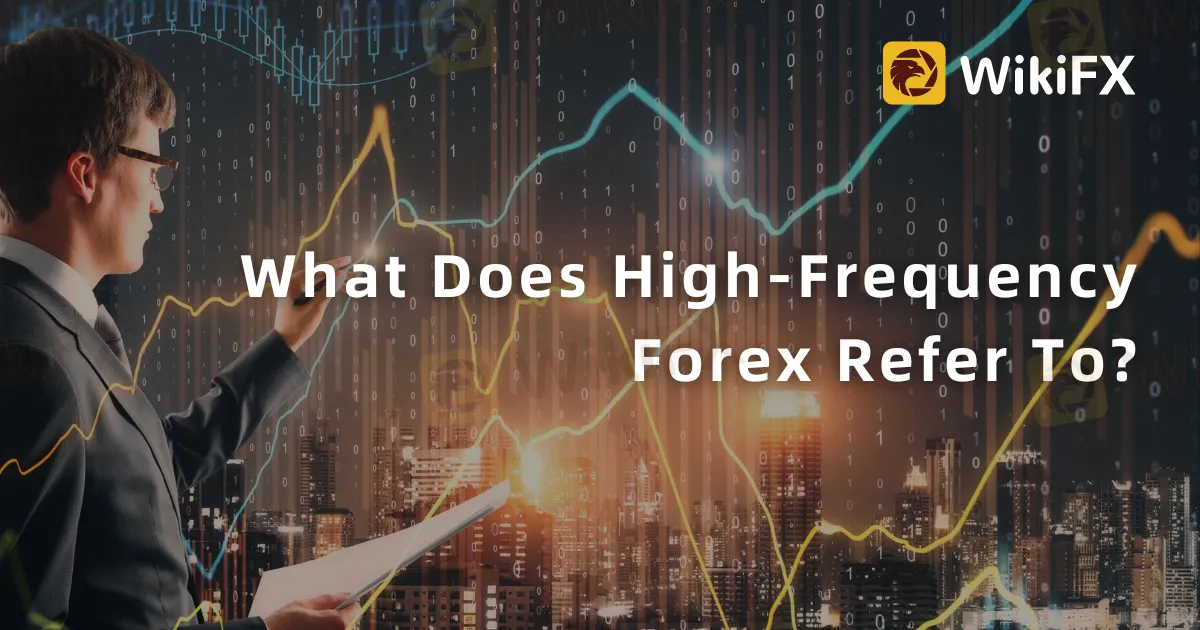简体中文
繁體中文
English
Pусский
日本語
ภาษาไทย
Tiếng Việt
Bahasa Indonesia
Español
हिन्दी
Filippiiniläinen
Français
Deutsch
Português
Türkçe
한국어
العربية
What Does High-Frequency Forex Refer To?
Abstract:In Forex trading, high frequency refers to a style of trading that uses complex algorithms and high-speed computer programs to execute trades at a very rapid pace. High-frequency traders aim to profit from small price movements in the market, and they do so by placing a large number of trades in a short period of time.

In Forex trading, high frequency refers to a style of trading that uses complex algorithms and high-speed computer programs to execute trades at a very rapid pace. High-frequency traders aim to profit from small price movements in the market, and they do so by placing a large number of trades in a short period of time.
High-frequency trading is also known as algorithmic trading or “algo” trading. It has become increasingly popular in recent years, as technological advancements have made it easier and faster to execute trades using automated systems.
Talking high-speed computer programs to execute trades. WikiFX offers a variety of VPS and EA at a low price. These two tools are considered essential to every trader who wanted to have a fast trading environment.
Check out this link: https://vps.wikifx.com/en/vps.html?source=fma3

How Does High-Frequency Forex Work?
High-frequency forex trading is typically executed using computer algorithms that are designed to identify and exploit small price movements in the market. These algorithms use a variety of indicators and statistical models to analyze market data in real time and generate trading signals.

Once a trading signal is generated, the algorithm will automatically execute a trade, typically within a fraction of a second. The trades are usually executed using specialized trading platforms and servers that are located close to the forex exchange, in order to minimize latency and ensure fast execution speeds.
High-frequency traders use a variety of different strategies to generate profits, including:
Market making: This involves placing orders on both the buy and sell side of the market, in order to create liquidity and capture the spread between the bid and ask prices.
Statistical arbitrage: This involves identifying price discrepancies between related assets and taking advantage of these discrepancies through rapid-fire trades.
Momentum trading: This involves trading based on short-term price momentum, typically using technical indicators such as moving averages and oscillators.
Increased liquidity: High-frequency traders help to increase liquidity in the forex market by providing a constant stream of buy and sell orders. This can make it easier for traders to enter and exit positions quickly, and can also help to reduce trading costs.
Faster execution speeds: High-frequency trading allows traders to execute trades at incredibly fast speeds, typically within milliseconds. This can be especially beneficial when trading in volatile market conditions, as it allows traders to take advantage of price movements before they have a chance to change direction.
Improved accuracy: High-frequency trading algorithms are designed to analyze large amounts of market data and identify profitable trading opportunities with a high degree of accuracy. This can help traders to make more informed trading decisions and increase their chances of generating profits.
Reduced emotions: High-frequency trading is largely automated, which means that traders can avoid making emotional decisions based on fear, greed, or other biases. This can help traders to remain disciplined and stick to their trading strategies, which can lead to better long-term performance.
How Can It Be Benefited To Traders
High-frequency trading can be very profitable, but it also comes with risks. Because trades are executed so quickly, there is a higher risk of errors and technical glitches. Additionally, high-frequency trading can create volatility in the market, as large numbers of trades are executed in short periods of time. This volatility can create both opportunities and risks for traders, depending on their strategies and risk tolerance.
High-frequency forex trading can offer several potential benefits to traders who use this strategy effectively, including:
Install the WikiFX App on your smartphone to stay updated on the latest news.
Download the App: https://www.wikifx.com/en/download.html?source=fma3

Disclaimer:
The views in this article only represent the author's personal views, and do not constitute investment advice on this platform. This platform does not guarantee the accuracy, completeness and timeliness of the information in the article, and will not be liable for any loss caused by the use of or reliance on the information in the article.
Read more

How to Automate Forex and Crypto Trading for Better Profits
Find out how automating Forex and crypto trading is changing the game. Explore the tools, strategies, and steps traders use to save time and maximize profits.

Is Infinox a Safe Broker?
INFINOX, founded in 2009 in London, UK, is a regulated online broker under the UK FCA. It offers diverse trading instruments like forex, stocks, commodities, indices, and futures. Clients can choose between STP and ECN accounts and access educational resources. With 24/7 customer support, INFINOX aims to empower traders with reliable tools and guidance.

Is Your Zodiac Sign Fated for Stock Market Success in 2025?
The idea that astrology could influence success in the stock market may seem improbable, yet many traders find value in examining personality traits linked to their zodiac signs. While it may not replace market analysis, understanding these tendencies might offer insights into trading behaviour.

Tradu Introduces Tax-Efficient Spread Betting for UK Traders
Tradu’s introduction of tax-efficient spread betting and groundbreaking tools like the Spread Tracker signals a new era of accessible, competitive, and innovative trading solutions for UK investors.
WikiFX Broker
Latest News
BI Apprehends Japanese Scam Leader in Manila
Bitcoin in 2025: The Opportunities and Challenges Ahead
Join the Event & Level Up Your Forex Journey
Is There Still Opportunity as Gold Reaches 4-Week High?
Bitcoin miner\s claim to recover £600m in Newport tip thrown out
Good News Malaysia: Ready for 5% GDP Growth in 2025!
How to Automate Forex and Crypto Trading for Better Profits
FXCL Lucky Winter Festival Begins
Warning Against MarketsVox
Is the stronger dollar a threat to oil prices?
Currency Calculator






